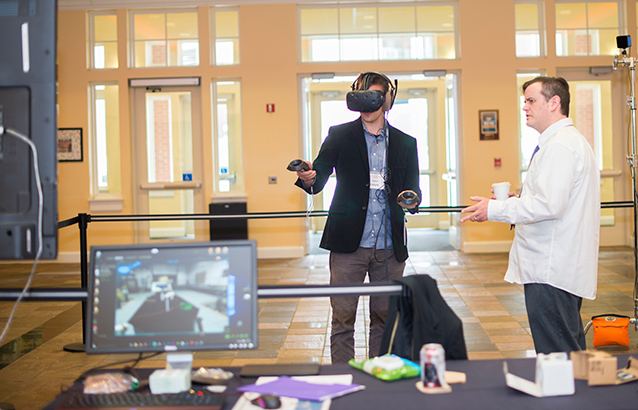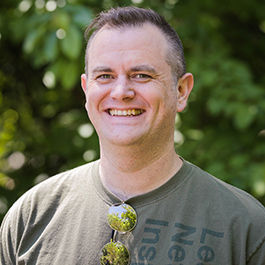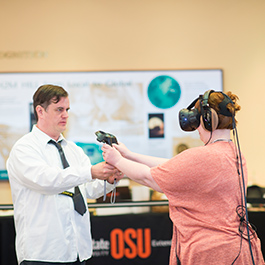Oregon State Ecampus Multimedia Developer

Oregon State Ecampus Multimedia Developer Warren Blyth helps an Ecampus faculty member test out new virtual reality technology at the 2016 Faculty Forum event.
By Heather Turner
May 11, 2016
Oregon State University Ecampus Multimedia Developer Warren Blyth came to OSU in 2008 after working at NaturalPoint, Inc., as a graphic designer, art director, web master and media and developer relations manager. He works with Ecampus instructors to develop engaging learning experiences for online students through animation, games and other technologies. He is the founder and publisher of Solid Fuel Studios LLC, a company that supports the work of artists, entertainers and craftsmen through publishing, printing, credit card processing services, web hosting, promotions and legal advice. Warren earned a Bachelor of Science in Computer Science degree from Oregon State University.
Hometown:
Born in Oakland, California. Warren grew up in a house surrounded by the Big Basin Redwoods State Park, eight miles outside of a small mountain town called Boulder Creek.
“But I spent most of my time down the road in Santa Cruz. Not sure which of those is my hometown. (Trivia: The movies The Tripper (2006) and Out On A Limb (1992) were filmed in my backyard, and The Lost Boys (1987) was filmed in Santa Cruz. Watch those three flicks if you’re curious where I grew up.)”
Years at OSU:
Eight.
Why did you choose to work for Oregon State Ecampus?
“After I received my computer science degree here at OSU, I spent about eight years doing a lot of design, marketing, movies and tech support for a local tech startup, NaturalPoint, Inc., who made cutting-edge head tracking devices for video games and assistive technology. It was a really intense and thrilling place to work, but eventually I built up the confidence to go start my own business up in Portland making comics and video games. Within a year, the Portland hipster art scene crushed my spirit. So when some friends at Ecampus suggested I move back to Corvallis and work with them, I leapt at the opportunity.”

What do you like most about your position as multimedia developer for Ecampus?
“I get to think deeply about how to use emerging technologies to teach, and make quick experiments to explore them. Technology touches a lot of different positions, but few jobs really let you simmer in it.”
You and your team are on the cutting-edge of technology, working with newly developed multimedia “tools” – briefly describe what these tools are and how they will advance online learning.
“Well, we sort through so many tools each month that it’s hard to sum up. But, if you figure our main focus is ‘saving time and money for our distance students,’ then I’d focus on two examples:
AR (augmented reality) apps: place virtual objects into the video through your phone or tablet. This lets us put life-sized objects in your living room without having to ship anything. And you don’t have to buy a plane ticket – or schedule a vacation – in order to come visit the quarter-million fish specimens stored over in Nash Hall on campus, you can just put each specimen on the couch in your house and study it from any angle. We’re doing a lot of work scanning OSU artifacts right now, hoping that one day soon they will all be easy to share worldwide.
Virtual reality (VR) goggles: let you feel truly present in distant places. So, any instructor can host a field trip when they travel just by bringing a 360 video camera with them. This films in all directions so they don’t have to think as much about framing. Plus, my team can animate virtual field trips into unfilmable conceptual spaces, such as into a molecule to see how RNA duplicates, following a hunting sperm whale as it fights giant squid or into an instructor’s metaphor for mathematical constructs. The unique feeling of ‘presence’ in another space and interacting with others in that shared space is going to change the whole concept of distance learning.”
“I get to be in this exciting space where we’re teaching teachers how to teach – with innovations that very few humans have ever used before.”
What do you like most about being able to test out and implement new and exciting multimedia tools at Ecampus?
“Staying abreast of emerging tools and techniques for learning. A lot of this stuff is so new we don’t have the words to describe the experience each tool offers. People tend to think a picture in a book is just as good as interacting with a life size hologram on the table next to you because they haven’t actually interacted with a hologram. So you have struggle to explain things like ‘spatial memory’ and ‘proprioception.’ On one hand, it’s really frustrating when people assume VR goggles are just the new 3D televisions (and refuse to even put them on). On the other hand, I get to be in this exciting space where we’re teaching teachers how to teach – with innovations that very few humans have ever used before.”

“Getting to focus on using these entertainment tools to improve society is probably the main reason I got into this field,” Warren says.
What do you wish others knew about your job?
“The line between engaging entertainment and teaching is very blurry. And maybe doesn’t exist! Game design, graphic design and movie making all share elements with instructional design. They just use different words to settle arguments. I think multimedia design is often dismissed as an optional cherry you could throw on top of a finished meal, instead of as another chef that needs to be in the kitchen.”
What made you decide to get into this field?
“I have a knack for summarizing and solving problems, and an obsession with the ways entertainment shapes society. All the multimedia developers at Ecampus basically get to make rough game demos and short movies each term. If we were in the movie making field, we’d have to wear fake smiles and hustle to land jobs all the time. If we were in the video game making field, we’d have to crunch all day and night to keep the company afloat. So getting to focus on using these entertainment tools to improve society is probably the main reason I got into this field.”
What do you believe is your greatest accomplishment in this position?
“The quantity of projects completed. It’s hard to pick one project as ‘the best rush job that had to be abandoned’ (we really only get to spend a couple months on each thing, tops). But it feels great to look back each year and realize I made dozens of useful things for different teachers in different fields.”
What advice would you like to give to students, alumni, faculty and/or advisors?
“Don’t assume you ‘get’ a new technology until you’ve gotten a chance to try it for more than five minutes. We’re bombarded with so many innovations almost every day now that we tend to file them away in simple folders. Human beings need stability, and that leads us to summarize complex and confusing things as quickly as possible. I see a lot of people incorrectly claiming one unprecedented tool is basically the same as a very different older tool because nobody has invented the words which explain the differences. Oversimplifying makes sense for most people in our culture, but educators need to go that extra mile to figure out the words that will help others ‘get it.’ So, take advantage of your opportunity to educate instead of shying away from it.”
What is one surprising thing about you that not many people know?
“I’m a huge movie nerd! I haven’t yet met anyone who takes film criticism as seriously as I do (or watches as many movies). I got really involved in KBVRtv here on campus back in 1998, and when I was one class shy of graduating, I quit college and moved to LA for a year. I helped on some small projects and got into some premieres. My short films got into some obscure festivals. But then right after Y2K, I got into an epic car crash with some street racing friends and ended up slinking back to Oregon to recuperate and finish my degree. I probably have serious brain damage (either from the crash or the movies)!”
What are your favorite activities outside of work?
“I still write, draw comics and develop indie video games in my spare time. I put a lot of thought into how I can create new methods of storytelling and how stories can offer insight into the human condition. I put a lot of thought into designing games around user input and how to use gameplay mechanics to encourage critical thought. Plus, my wife and two young boys are teaching me to get out of my head and just play.”

